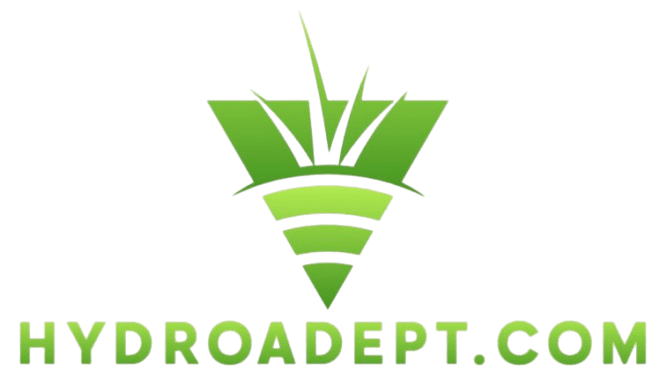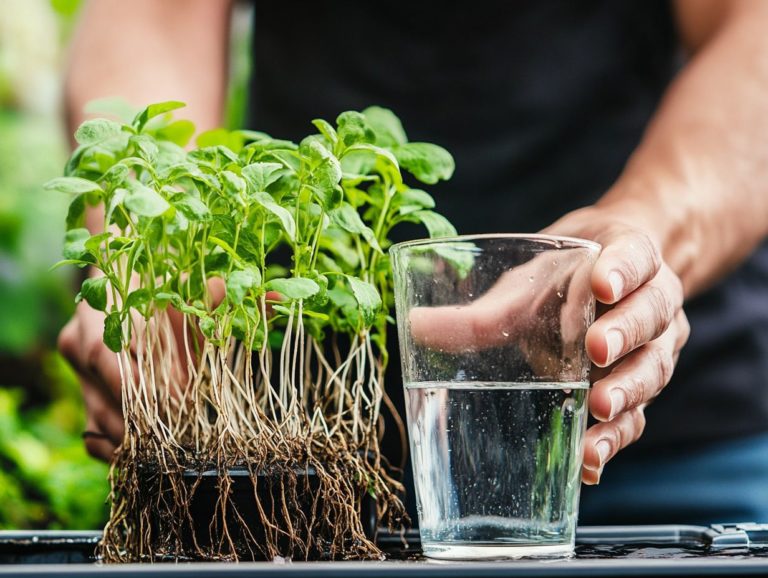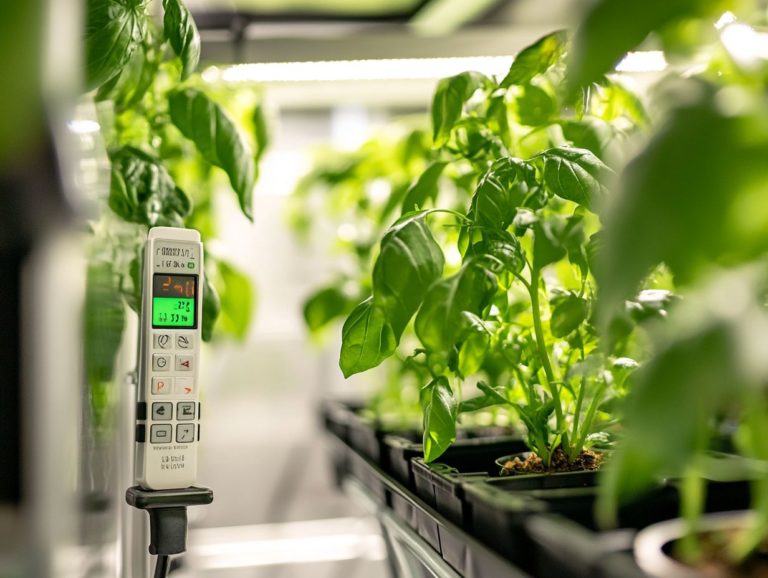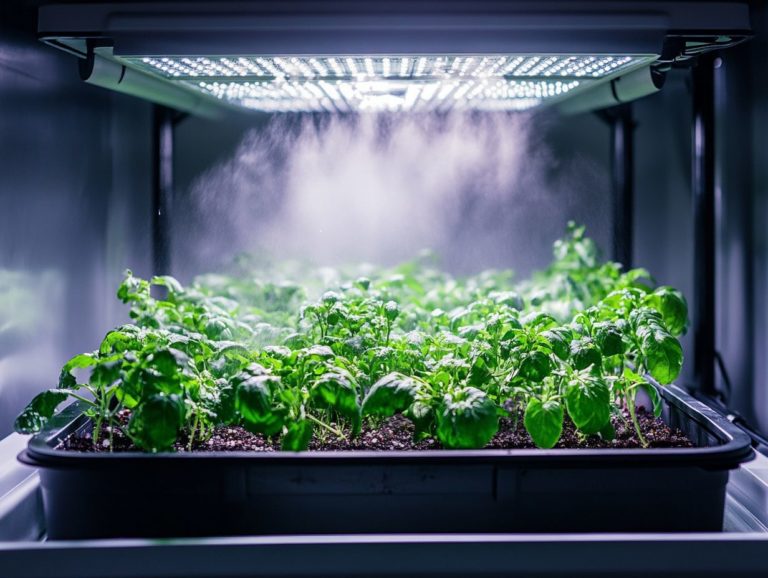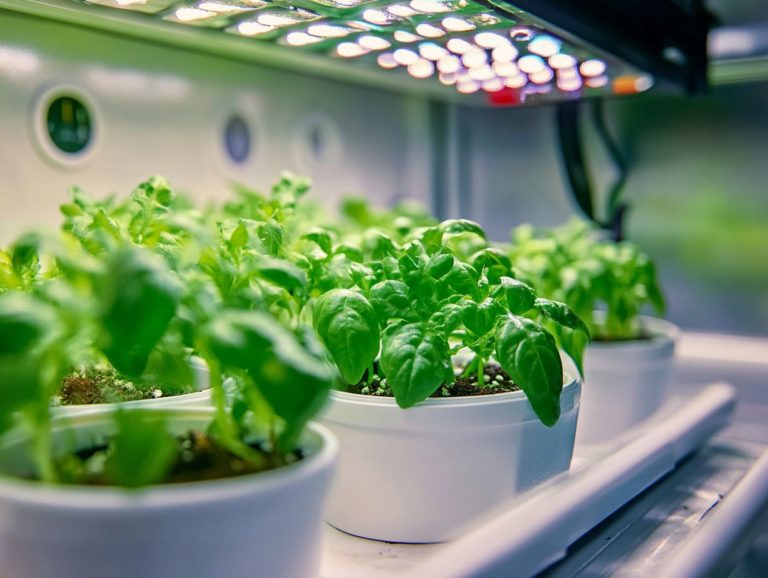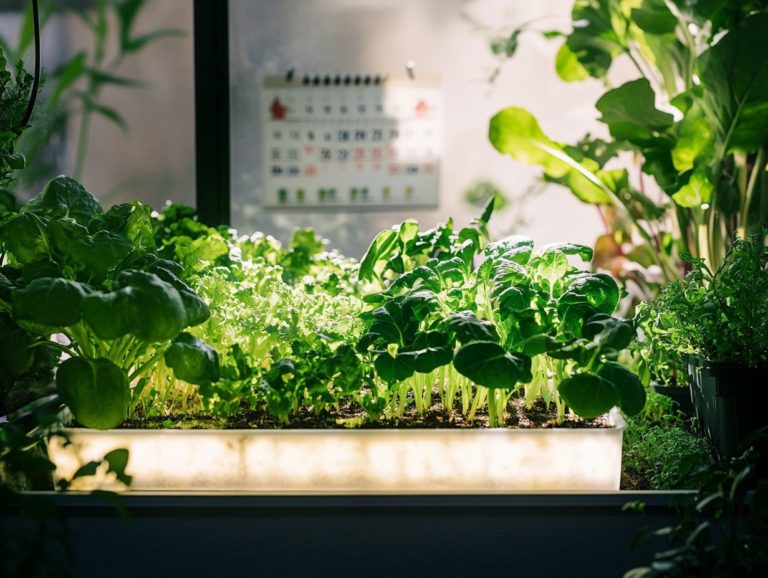What Are Hydroponic Gardening Certifications?
Hydroponic gardening certifications are essential for anyone eager to deepen their knowledge and enhance their skills in this innovative agricultural landscape. This is particularly important in the realm of hydroponics and aquaponics.
In this article, you will discover the numerous benefits of obtaining a certification. It highlights how certifications can unlock new career opportunities and propel your professional journey forward, especially in market gardening and among commercial growers.
It outlines the various types of certifications available and the steps required to attain one. This includes compliance checks, safety standards, and invaluable tips for maintaining your certification through ongoing education.
Additionally, we address crucial factors and resources to help you select the certification that best suits your aspirations. These include hydroponic training and supplier certifications.
Whether you are an experienced gardener or just beginning your adventure, this guide offers insightful guidance for navigating the world of hydroponic certifications and understanding industry standards.
Contents
- Key Takeaways:
- Understanding the Basics
- Benefits of Obtaining a Certification
- Types of Hydroponic Gardening Certifications
- How to Obtain a Certification
- Maintaining a Certification and Ensuring Compliance
- Choosing the Right Certification for You
- Frequently Asked Questions
- What are Hydroponic Gardening Certifications?
- Why should I get a Hydroponic Gardening Certification?
- What types of Hydroponic Gardening Certifications are available?
- How do I earn a Hydroponic Gardening Certification?
- Are there any prerequisites for obtaining a Hydroponic Gardening Certification?
- How long does it take to complete a Hydroponic Gardening Certification program?
Key Takeaways:
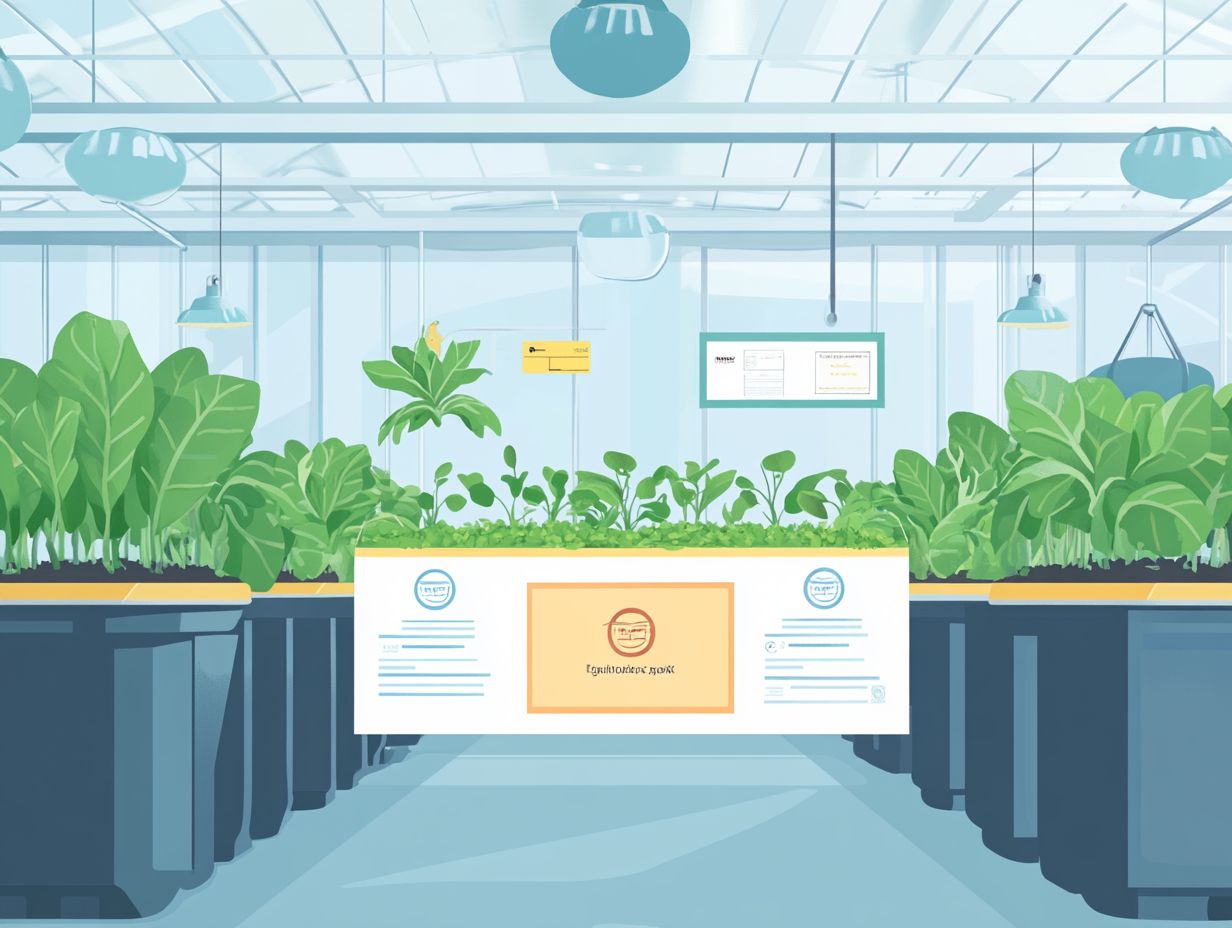
- Hydroponic gardening certifications offer numerous benefits, including career advancement, product quality, and opportunities.
- Several types of hydroponic gardening certifications are available, each with its own requirements and process for obtaining and maintaining.
- When choosing a certification, consider your career goals, available resources for research, and the importance of market research. Stay updated and continue learning through hydroponics training for certification renewal.
Understanding the Basics
Understanding the basics of hydroponics is essential for anyone keen on innovative agricultural practices. These practices range from environmental controls to nutrient delivery systems. Hydroponics is a method of growing plants without soil, utilizing nutrient-rich water solutions to promote plant growth.
This technique maximizes space and allows you to exercise precise environmental controls and effective nutrient management. This ensures your plants receive the nutrients they need for healthy development.
You can even combine hydroponics with aquaponics, which involves integrating fish farming to create a sustainable ecosystem. Familiarizing yourself with the various hydroponic systems, growing media, and crop management techniques is vital for your success, especially in organic farming practices.
As interest in sustainable farming practices continues to rise, hydroponics stands out due to its ability to conserve water, reduce pesticide usage, and ensure equipment safety. Key components such as growing trays, nutrient solutions, and pumps form efficient systems designed for optimal growth, adhering to international standards.
Environmental controls are crucial for regulating temperature, humidity, and light to create ideal conditions for your plants. Understanding intricate nutrient delivery systems and effective nutrient management is paramount, as each plant species has unique requirements.
For anyone venturing into this field, building a solid technical foundation will enable you to maximize your hydroponic setup’s efficiency. This will help you produce healthy, high-yield crops while ensuring compliance with safety standards.
Benefits of Obtaining a Certification
Securing a certification in hydroponics brings many advantages. These include elevating your career prospects and adhering to industry standards, such as meeting the rules set by authorities.
These certifications validate your expertise in hydroponics, aquaponics, and related agricultural practices. They simplify the process of ensuring product quality and that your hydroponic equipment meets safety standards. You will also gain valuable market research insights and customer education tools, facilitating compliance checks and enhancing your understanding of product assurance.
Pursuing an organic certification can set your hydroponic farm apart in a competitive landscape. It unlocks new opportunities and expands your network, while ensuring adherence to FDA regulations and CSA standards.
Don t miss your chance to transform your gardening skills with a hydroponics certification! Enroll in a program today to start your journey.
Career Advancement and Opportunities
Career advancement opportunities in hydroponics are plentiful for those who choose to invest in training and certifications. Hydroponic training programs are particularly valuable as this burgeoning industry continues to expand. With more commercial growers embracing hydroponic methods, the demand for skilled professionals who can manage and optimize these systems is on the rise.
Roles like hydroponic farm managers and consultants are highly coveted. These positions are pivotal for managing the challenges of modern farming methods, ensuring that you follow electrical safety guidelines and ensure product quality. To truly thrive in these roles, a commitment to ongoing education is essential. This includes understanding the latest advancements in electrical appliances and environmental management.
Pursuing specialized certifications sharpens your practical skills and deepens your understanding of critical areas such as environmental management, pest control, and nutrient optimization. This dedication to continual learning ensures you remain competitive in the field, ultimately paving the way for greater career satisfaction and opportunities for advancement, especially in organic production.
Types of Hydroponic Gardening Certifications
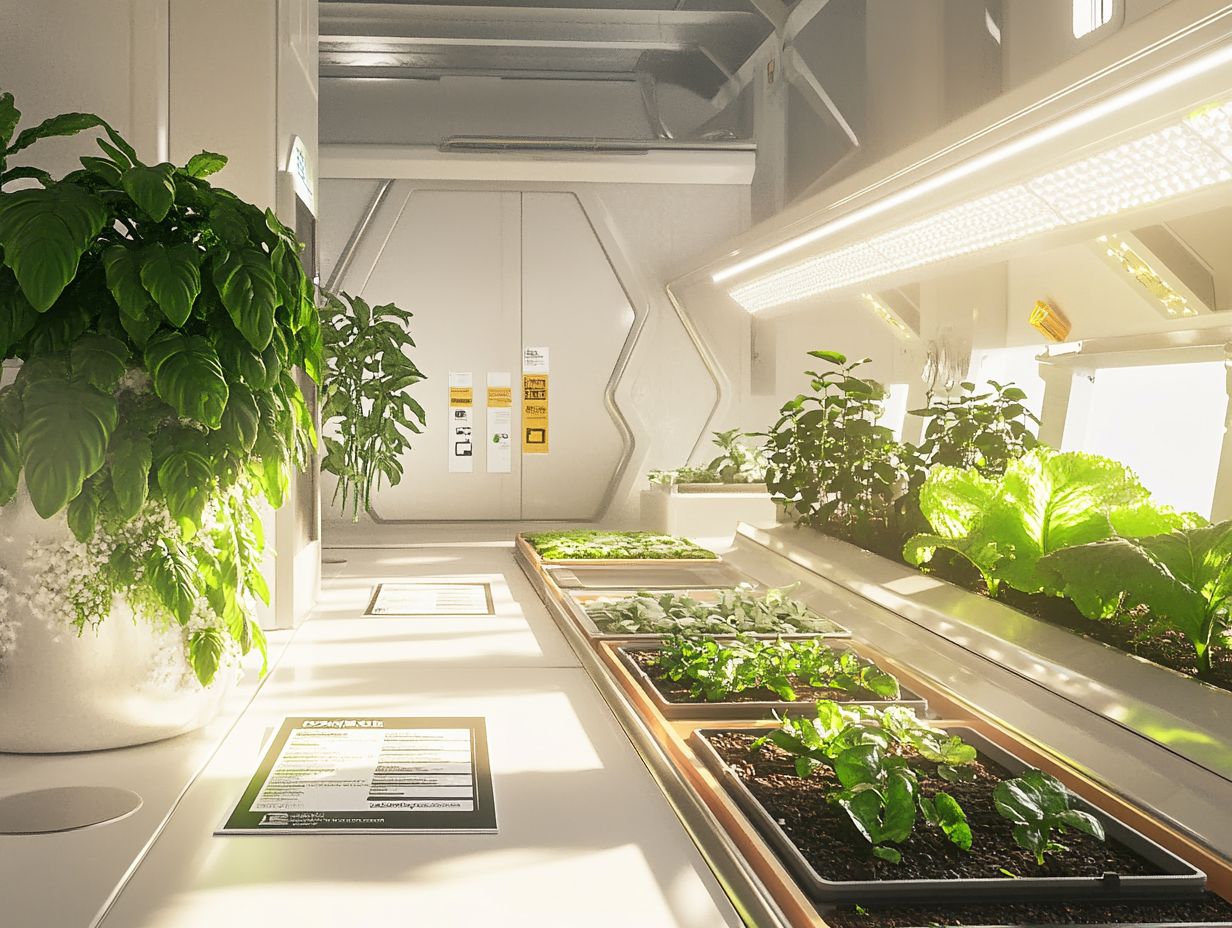
A variety of hydroponic gardening certifications exist to meet your unique needs and interests, ranging from foundational knowledge to specialized training in organic practices. These certifications validate your expertise in hydroponic and aquaponic systems, ensuring you meet industry standards and regulatory compliance.
You might consider pursuing organic certification, which emphasizes sustainable practices, or supplier certifications that guarantee quality and safety assurance. Numerous training programs are also available, providing you with hands-on experience and the technical knowledge essential for thriving in hydroponic gardening.
Overview of Different Certifications Available
Exploring the variety of certifications available in hydroponics unveils a rich tapestry designed to meet diverse needs. From organic certification to compliance with CSA standards and FDA regulations, these certifications ensure adherence while elevating product assurance and safety standards in hydroponic practices.
When you obtain certifications from recognized testing laboratories, you validate the effectiveness of your hydroponic equipment and nutrient solutions while ensuring compliance with third-party testing. As the demand for quality hydroponic produce rises, understanding the significance of these certifications is vital for growers seeking to establish credibility in a competitive market.
One of the most coveted certifications is the USDA Organic certification, which indicates that your practices align with stringent organic farming standards. Similarly, the Good Agricultural Practices (GAP) certification focuses on food safety and quality, providing guidance on maintaining hygienic conditions throughout the production process. Certifications like ISO 9001 highlight robust quality management systems.
Each of these certifications not only ensures compliance and safety but also cultivates consumer confidence in the hydroponic products available today. Therefore, whether you’re an aspiring grower or an established one, recognizing the importance of securing these credentials from recognized authorities is essential for enhancing your operational credibility.
Start your journey in hydroponics today and elevate your career with the right certifications!
How to Obtain a Certification
To obtain a hydroponics certification, you ll need to navigate specific requirements that vary depending on the certification type. This includes tests to ensure you meet the required rules and regulations. Your journey often begins with enrolling in comprehensive hydroponics training programs. Here, you’ll explore essential topics like nutrient management, environmental controls, hydroponic equipment, and safety standards.
After your training, you may face compliance checks to confirm your understanding of industry regulations, including FDA rules and electrical safety. For some certifications, you might need a valid business license to ensure you re ready for the professional demands of the hydroponics industry.
Requirements and Process
The path to certification typically involves completing specialized training in environmental management and navigating various assessments related to hydroponic systems and practices. You ll engage in documented training that covers both theory and practical skills essential for effective hydroponic gardening.
Compliance checks may also be a part of your certification journey, confirming your grasp of safety standards and regulatory requirements. Providing documentation of your coursework and practical experience is essential for validating your certification process.
Along with foundational elements, specific training will explore nutrient management, pest control, and environmental monitoring. You can expect various assessments, including written tests, practical demonstrations, and project submissions to gauge your comprehension and hands-on capabilities in line with industry standards.
Assessors may conduct compliance checks, which might include site inspections and reviews of your operational procedures to ensure adherence to best practices.
By maintaining accurate documentation throughout your training, you streamline the certification process and foster accountability. This enhances your credibility in the field and ensures compliance with regulatory standards.
Maintaining a Certification and Ensuring Compliance
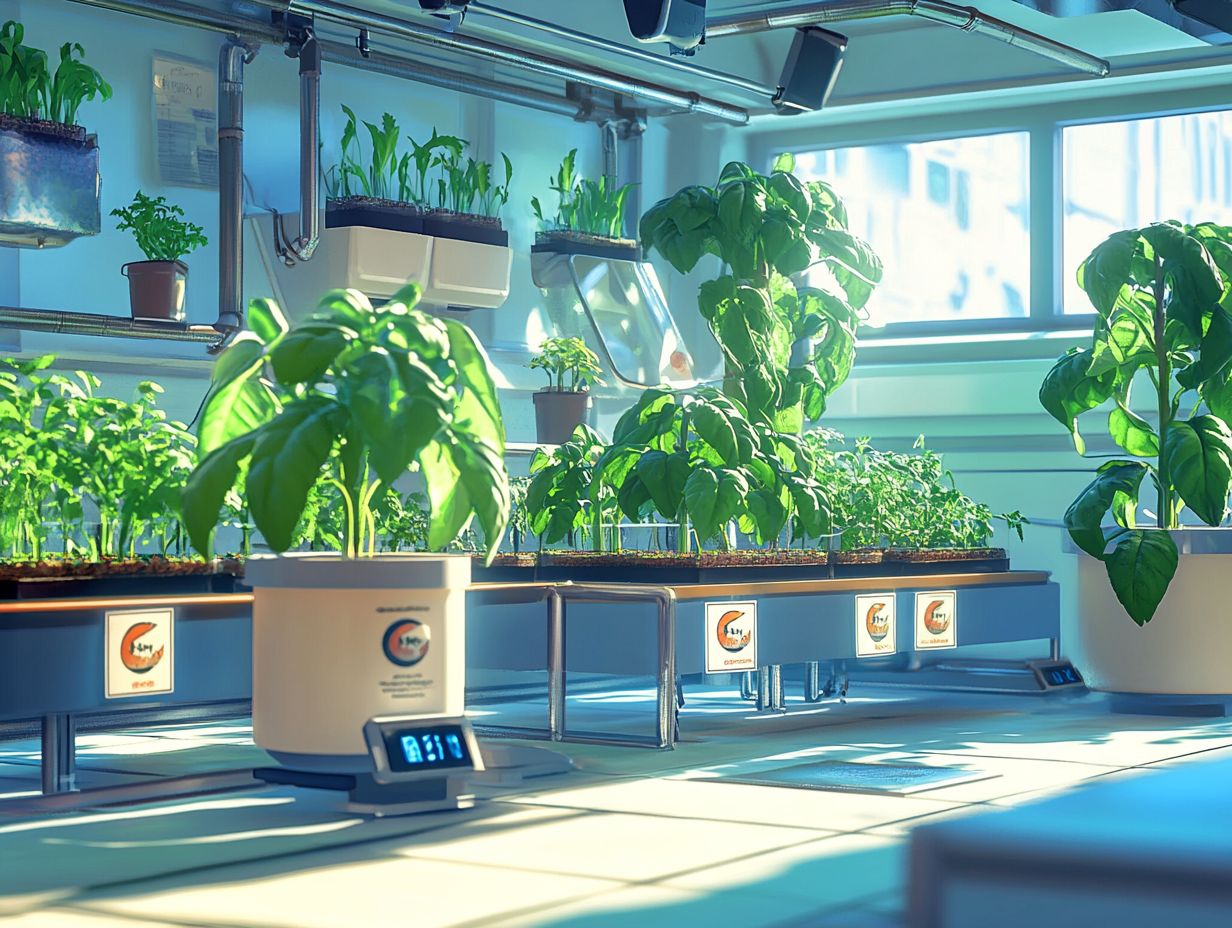
Maintaining your hydroponics certification calls for your passion and commitment to continuous education and a structured renewal process that aligns you with the latest industry standards.
To stay compliant, you may need to engage in workshops, seminars, or additional training that reflect current advancements in hydroponic technology. This renewal process emphasizes the importance of being informed about safety standards, new regulations, and innovative techniques that can elevate product quality and enhance cultivation efficiency.
Continuing Education and Renewal Process
Continuing education is vital for renewing your hydroponics certification. It keeps you updated on the latest trends in the field and best practices. By participating in continuing education programs, you can attend workshops that explore new technologies, regulatory changes, and advancements in nutrient management.
This commitment to lifelong learning enhances your hydroponic practices and helps you maintain your credentials in a fast-paced industry. Exploring various forms of continuing education, like specialized online courses or immersive in-person seminars, allows you to deepen your understanding and sharpen your skills.
Many of these programs fit seamlessly into busy schedules, making it easy for you to stay ahead in the field. Proactively engaging in these activities not only enhances your expertise but also opens doors to valuable networking opportunities with peers.
By prioritizing ongoing education, you ensure that you remain at the forefront of innovative practices and compliance, ultimately contributing to your success and the integrity of the hydroponics industry.
Choosing the Right Certification for You
Selecting the right certification in hydroponics is an important decision that demands your careful attention to various factors. This ensures alignment with your career aspirations and expertise.
Understanding the certification requirements such as the target audience and specific focus areas helps you make informed decisions that truly resonate with your goals. Market research helps you find certifications valued by employers and industry professionals.
Aspiring hydroponists must evaluate different training programs and supplier certifications. This way, you can choose a path that best supports your ambitions in the world of hydroponics or aquaponics.
Factors to Consider and Resources for Research
When selecting a hydroponics certification, you must weigh several factors, such as market demand, industry standards, and certification requirements that align with your career aspirations. Dive into resources like industry publications, online forums, and professional associations to gain valuable insights into the credibility and relevance of various certifications.
Networking with seasoned professionals in hydroponics can guide you on which certifications would most effectively bolster your career advancement. This ensures your choice is both informed and strategic.
Emerging trends like sustainability and vertical farming increasingly influence the hydroponics landscape, sparking a growing interest in specialized certifications. Understanding the potential Return on Investment (ROI) from these certifications is crucial; some may offer greater advantages in job placements and salary increases.
Utilizing reputable resources such as the Hydroponic Society of America, the National Gardening Association, or local community colleges can assist you in pinpointing credible courses. Online platforms like LinkedIn and dedicated hydroponics forums serve as vibrant hubs for knowledge exchange and personal experiences, enabling you to make well-informed decisions about your certification journey.
Frequently Asked Questions
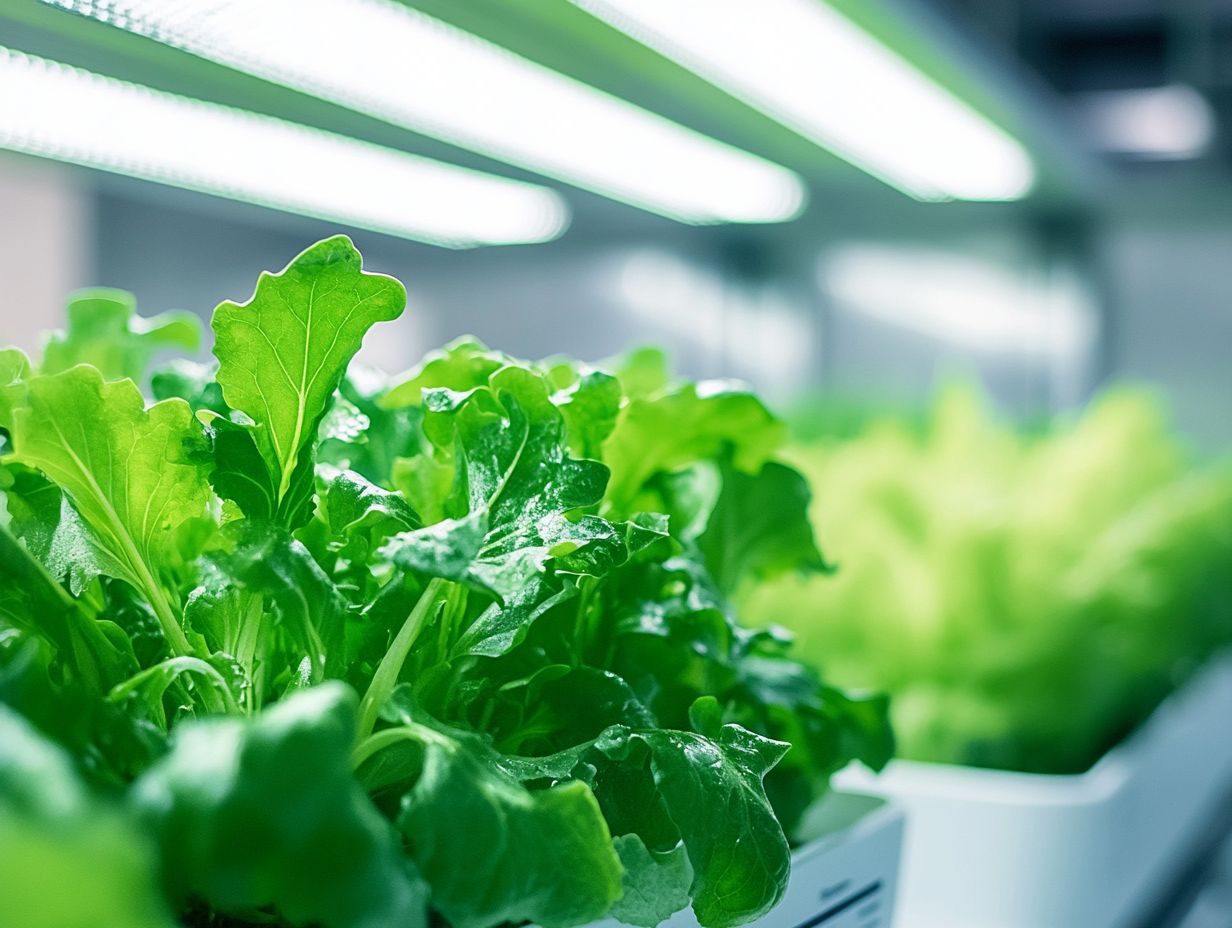
What are Hydroponic Gardening Certifications?
Hydroponic Gardening Certifications are credentials that demonstrate a person’s knowledge and expertise in the field of hydroponic gardening.
Why should I get a Hydroponic Gardening Certification?
Obtaining a Hydroponic Gardening Certification can enhance your credibility and open up job opportunities in the growing industry of hydroponic gardening.
What types of Hydroponic Gardening Certifications are available?
There are various types of Hydroponic Gardening Certifications, including basic, intermediate, and advanced levels, as well as specific certifications for different types of hydroponic systems.
How do I earn a Hydroponic Gardening Certification?
To earn a Hydroponic Gardening Certification, you need to complete a training program that covers all aspects of hydroponic gardening, including plant biology, nutrition, equipment, and pest management.
Are there any prerequisites for obtaining a Hydroponic Gardening Certification?
Some certification programs may require a certain level of education or work experience in agriculture or horticulture before enrolling.
How long does it take to complete a Hydroponic Gardening Certification program?
The length of a Hydroponic Gardening Certification program can vary, but most can be completed within a few weeks to a few months, depending on the level and intensity of the training.
